Lead management sits at the core of your business’s success. Without a constant fresh stream of incoming leads, your sales may dry up. Generating new leads is one part of it, but what you do with the leads you get is just as important, if not more so.
Turning leads into satisfied customers comes down to the quality of your lead management process. But what exactly does that process look like, and how can you make it work for your business?
In this post, we’ll take you through the stages of building a successful lead management process, how to measure its impact, and how AI-led platforms like monday CRM can help you streamline the process and convert more leads without expanding resources.
Try monday CRMWhat is lead management?
Lead management is the process of organizing, tracking, and nurturing leads after they’ve shown interest in your product or service, with the ultimate goal of locking them in as loyal customers. It includes everything from qualifying and scoring leads to sending targeted emails, tracking interactions, and ensuring timely follow-ups through tools like forms, surveys, and direct outreach.
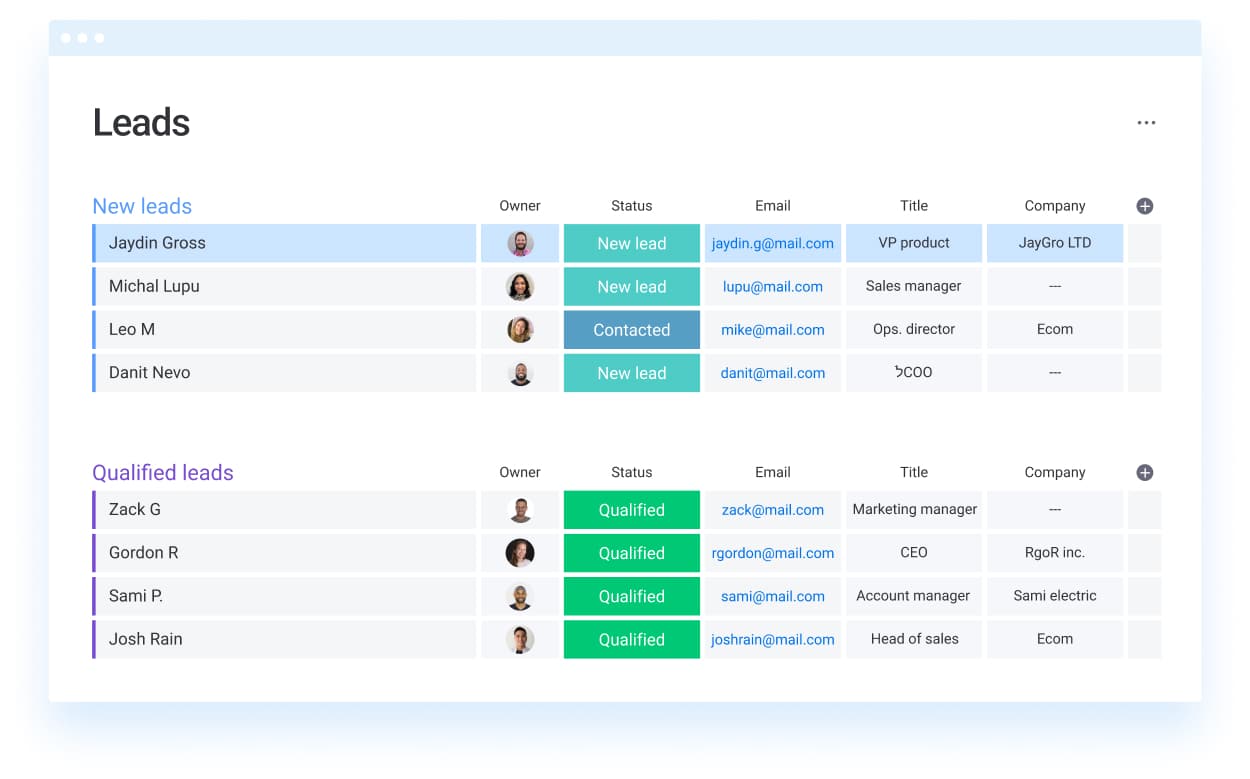
What is the lead management process?
The lead management process is a structured approach to capturing, qualifying, nurturing, and converting potential customers (known as leads) as they move through your sales pipeline. The process includes key stages that help teams engage the right prospects at the right time, ultimately turning interest into action.
There are 7 core stages in the lead management process, which we’ll walk through later in this article. Together, these stages help businesses:
- Find new prospective customers
- Determine if they’re a good fit
- Build rapport through effective communication
- Encourage them to buy your product or service
Managing this process well means more than just staying organized. It’s what enables your team to convert a higher percentage of leads into paying customers. But with so many moving parts, it’s easy to lose momentum or miss opportunities.
That’s why marketing automation is a critical part of any effective lead management strategy. It ensures leads continue progressing through the pipeline with minimal manual work. Analytics also play a vital role, helping you understand what’s working and where improvements are needed.
To simplify and streamline your efforts, a dedicated lead management platform like monday CRM combines automation and real-time insights, giving you the tools to optimize every step of the process.
Try monday CRMWhat makes the B2B lead management process unique?
Unlike the fairly streamlined B2C sales funnel, the B2B lead management process often involves longer sales cycles, multiple decision-makers, and more complex nurturing strategies. The B2B process focuses heavily on identifying high-quality leads, engaging them with personalized and relevant content, and guiding them through multiple touch points to best address each lead’s unique business needs and challenges.
Successful B2B lead management relies on close alignment between marketing and sales teams and data-driven segmentation. AI and automation tools also play a crucial role in prioritizing and moving B2B leads efficiently through a pipeline.
How a mature lead management process can benefit your business
Businesses with a mature lead strategy are more likely to attract and convert high-quality leads because they focus on solving real customer problems — not just pushing products. Addressing buyer needs at the right time builds credibility, keeps prospects engaged, and helps guide them toward a faster, more confident decision.
A streamlined, automation-friendly lead management process can offer major advantages, including:
- Optimizing your sales funnel: Remove bottlenecks, opportunities for error, and inconsistencies with a well-oiled lead management process that relies on automation.
- Prioritizing high-value leads: By qualifying each lead, you won’t waste time and resources on leads that have a low likelihood of converting.
- Preventing losing good leads: When your lead management process is automated to include follow-ups and reminders, you’re less likely to lose quality leads in the nurturing process.
- Following up at the right time: By building custom automations to send follow-ups at the right time, you can make sure leads are always engaged, but your communication isn’t coming off as overbearing.
- Improving relationship building: Focusing on high-value leads helps you build stronger relationships to instill long-term customer loyalty and satisfaction.
Raw leads: What are they and how to qualify them
When leads enter your sales funnel, they’re considered raw leads. When you analyze them, evaluate their potential for becoming paying customers, and determine the next steps for engagement, they become qualified leads.
Qualified leads can be divided into 2 categories:
- Marketing qualified leads (MQLs): Marketing qualified leads are interested prospects that are not yet ready to buy and still need some nurturing by your marketing team.
- Sales qualified leads (SQLs): Sales qualified leads are prospective customers ready to deal with your sales team.
It’s important to differentiate between MQLs and SQLs throughout the lead management process since they fall into different stages, which we’ll get into later. Understanding whether a lead is raw, MQL, or SQL can help you segment them and assign them to the right sales agents to make the most of the opportunities each lead presents.
Is your lead hot or cold? Understanding different types of leads
Aside from raw, MQL, and SQL leads, another way to categorize potential customers is by determining how engaged they are on a scale of cold to hot. This will help your sales and marketing team create specific plans of action for every stage of the lead management process that are appropriate for each type of lead.
Cold leads
Cold leads are the sales leads that sit right at the top of your sales funnel. That means they’ve never interacted with your company or shown an interest in your product or service before.
This may make them seem like the most difficult leads to convert, but with the right research and strategic campaigns to offer clear value and a personalized approach, cold leads can warm up. That said, it’s also important to know when to let go of cold leads if they are not leading anywhere so that your sales team can focus on higher priority leads.
Warm leads
Warm leads are a more enticing prospect. These are people who are already familiar with your brand and have shown an active interest in your product or service. They’ll typically have already given your team their contact details through different channels, such as:
- Signing up for your newsletter
- Accessing a lead magnet, such as an ebook
- Engaging with your live chatbot
- Getting referred by one of your existing leads or customers
- Connecting with your brand on social media
Qualifying warm leads is easier since they’re already open to hearing from you through at least one channel.
Hot leads
Hot leads are generally the easiest type to win over, because they’re already at the bottom of your sales funnel. They’ve already moved through the lead management process smoothly and are ready, or almost ready, to convert. Hot leads have looked at your product or service from all sides, had a demo, and decided it’s what they need. They’ve got the budget and the authority to buy, and they’re ready to close the deal.
What are the 7 stages of a lead management process?
To increase your customer base and strengthen lead management, you need to engage with prospective customers throughout your sales funnel. Here are the 7 steps that make up a comprehensive lead management process:
1. Lead capture
Generating new leads is no good if you don’t have a way to gather their information and start to engage with them. Lead capture is the process of using landing pages, social media, short forms, and pop-ups to gather contact details and useful information about your leads, all so you can effectively reach out to them and keep them interested in what you’re offering.
2. Lead tracking
Having identified your leads, you need to follow them throughout their engagement with your company. This stage is known as lead tracking and includes heavily monitoring and analyzing the details of a lead’s journey through your sales funnel.
Tracking your leads helps you figure out:
- Which sources generate the best leads
- How long it takes for a lead to become a paying customer
- Drop-off rates
- Stages at which leads drop off
This knowledge is crucial for keeping your lead management effective and efficient. A lead-tracking app can be incredibly helpful here. For instance, monday CRM lets teams view lead information and interactions at a glance, and clearly understand where each lead stands in the pipeline.
The other benefit of using a platform like monday CRM is that it can automate a lot of tracking for you. Lead tracking can be a cumbersome task when done manually, but with monday CRM’s built-in AI and automation tools, you can work quickly while the CRM populates essential information and insights.
Try monday CRM3. Lead qualification
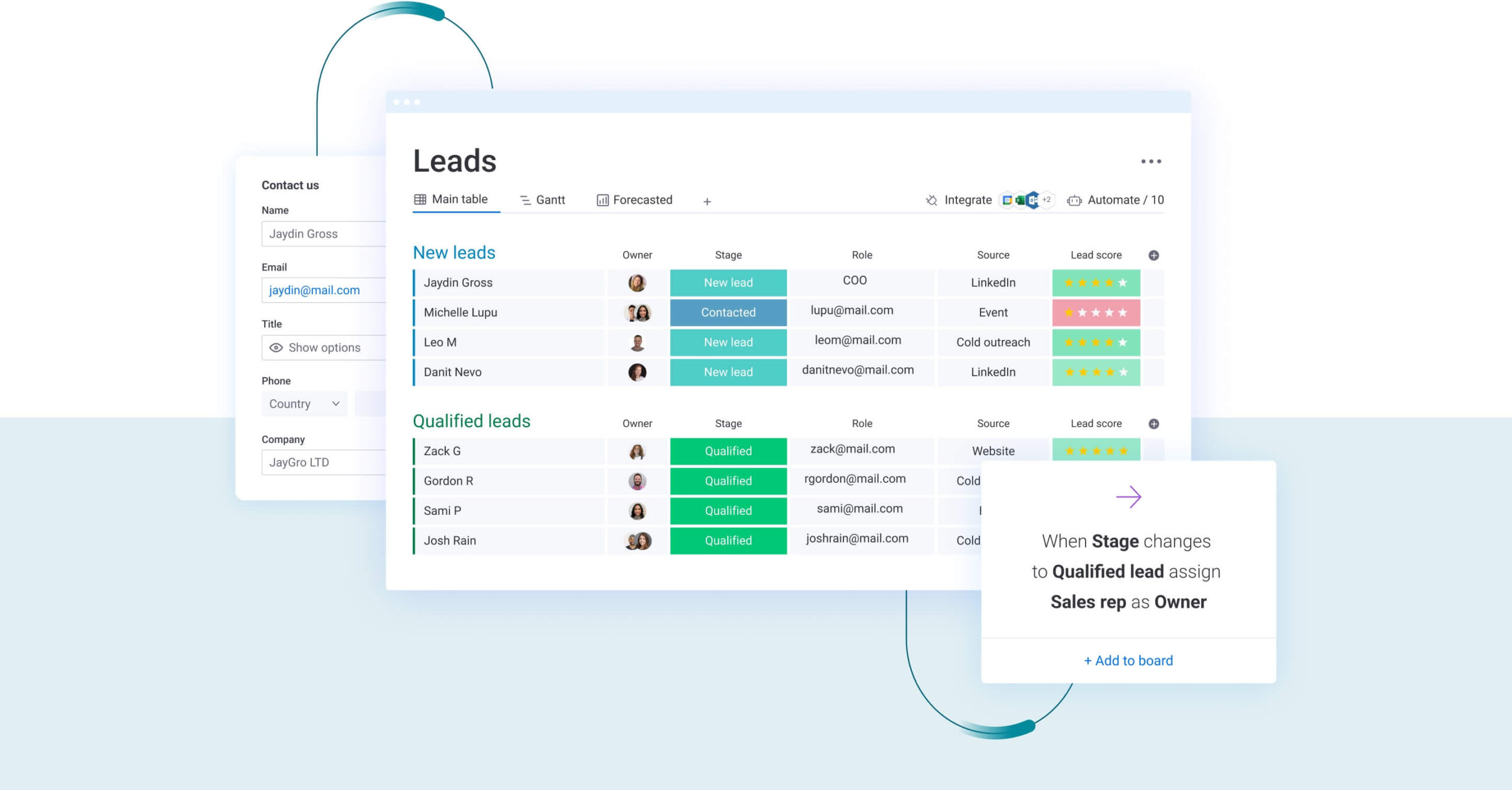
Lead qualification helps you assess your leads and predict how much you should invest in trying to convert them. Lead qualification involves:
- Pinpointing an ideal customer profile (ICP): Define the type of company that’s the best fit for what you’re selling based on industry, size, budget, and other firmographics.
- Creating buyer personas: Identify the key people inside your target companies, understand what they care about, and how your product can help them succeed.
- Using lead qualifying questions: Ask questions that let you assess a lead’s likelihood of becoming a paying customer.
- Calculating the value of each lead with lead scoring: Assign a score to how high-potential your lead is, and to see if they’re an MQL.
- Assessing lead behavior: Look closely at whether your leads are engaging, reading your messages, or visiting your website to see how warm or cold they are.
- Segmenting your leads: Sort your leads into categories, depending on their lead score and where they are in the customer journey, so that you can nurture them appropriately.
Lead qualification lets you understand your leads and their needs, build stronger relationships, and focus your lead management process effectively.
4. Lead nurturing
Building trust and a positive, lasting relationship with your leads is what will help them progress through the sales funnel and encourage them to become a paying customer. You’ll need different types of content and messaging for leads at different stages of your sales funnel. Educating top-of-funnel leads and engaging middle-of-funnel leads is just as important as the big ask at the bottom of the funnel.
Customizable email templates can be useful here. With monday CRM, you can pair templated emails with AI-generated content for deeper personalization, automated rules, and real-time notifications, so that you know as soon as a lead receives, opens, or replies to an email. AI-powered automations can also help you follow up so that you don’t need to worry about manually checking in on every lead.
5. Lead distribution
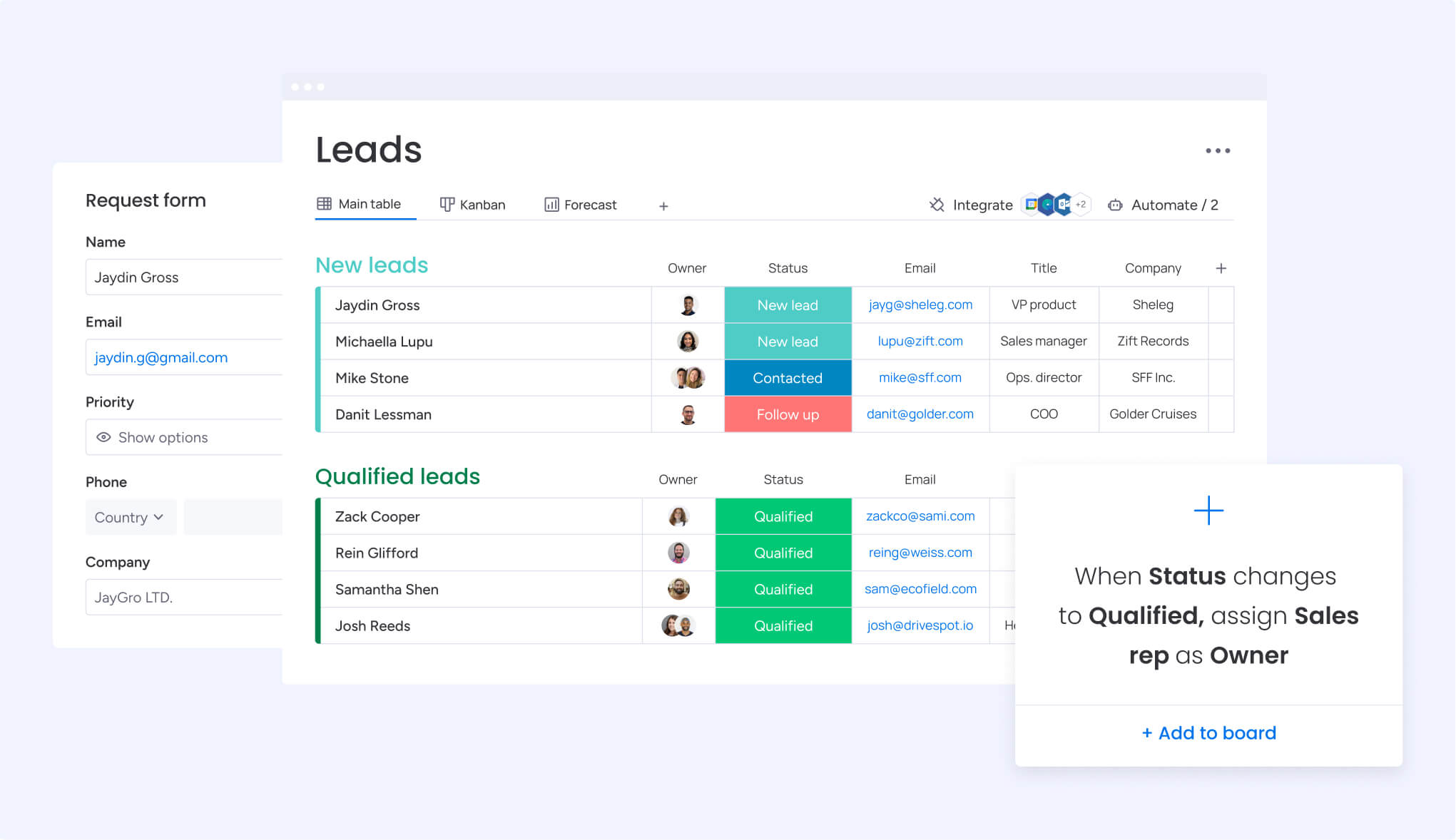
Making sure you have the right people engaging with each lead is key to converting leads into paying customers. Lead distribution is all about connecting each lead with the best sales rep for the job, taking into account the experience and expertise of your salespeople so that you can have the best opportunity of closing each sale.
On platforms like monday CRM, lead distribution can be done automatically when a new lead comes in or when a lead’s status gets updated. This way, you don’t need to spend time organizing incoming leads one by one to assign them to the right agents.
6. Lead conversion
Next in the journey is lead conversion. This is the term for that crucial moment when you turn a lead into a paying customer. At this stage, your sales team should have all the data and insights they need to close a sale, and the lead should already be engaged and ready to buy.
Using the information about each lead gained during the qualification and nurturing phases, you should have a wealth of personalized solutions to offer a potential customer that will make it easier to close the deal.
7. Leads analytics and reporting
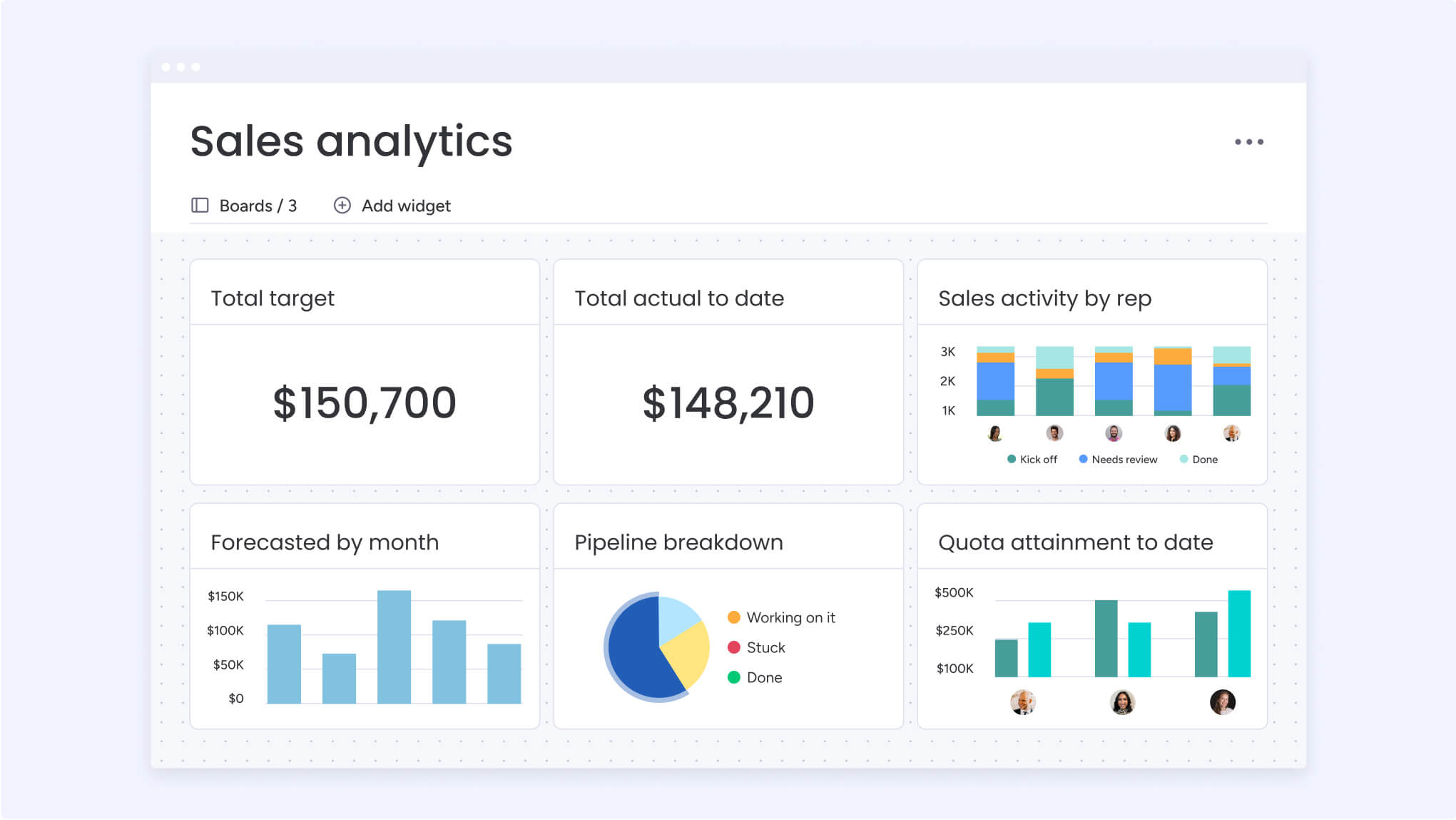
Understanding your leads’ behavior throughout their journey with your business is important for optimizing your top-of-funnel marketing, speeding up your response rates, and ultimately increasing your conversions. Lead analytics and reporting allow you to:
- Understand your leads and customers
- Identify trends and patterns
- Personalize your interactions to address their priorities and pain points
With monday CRM, you can access AI-driven dashboards, real-time reports, forecasting charts, and more to get a clear perspective of your conversion rates and understand how well your sales team is doing.
Boost conversions with monday CRM and AI-powered lead management
monday CRM empowers your marketing and sales teams to efficiently manage the entire sales cycle with a single, intuitive, customizable, no-code platform. Thanks to monday CRM’s built-in AI and sales automation features, you can also make sure your leads are always top priority and nothing falls through the cracks.
monday CRM makes it possible for teams to create their own no-code automations in just a few clicks, powered by smart AI so that each action goes even further. Customize the entire platform from top to bottom to fit your unique lead management process, from the way you view your incoming leads to how you manage workflows and beyond. Additionally, with plenty of tools for collaboration and communication, monday CRM makes it simple for team members to get real-time updates on high-priority leads.
Let’s take a closer look at some of the key monday CRM features that can assist your team in optimizing your AI-powered lead management process.
Integrate your work tools to sync lead data
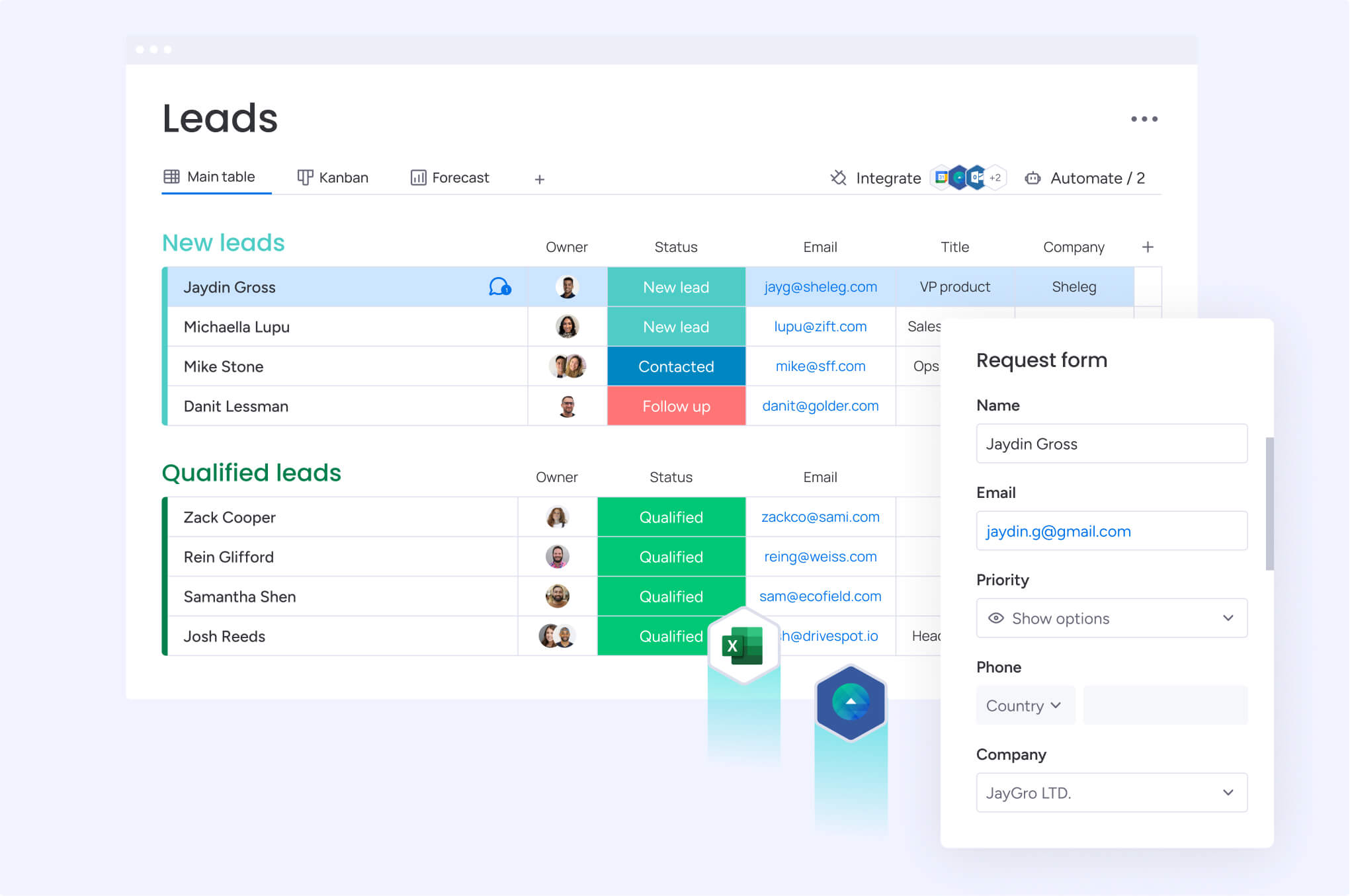
Integrated with over 200 popular work tools, monday CRM makes it easy to control the flow of data between your CRM and platforms like SurveyMonkey, Mailchimp, and Gmail. Your sales and marketing team can get instant updates and notifications when leads open an email or their status changes, helping you prepare the next course of action.
Automate lead nurturing and engagement with AI
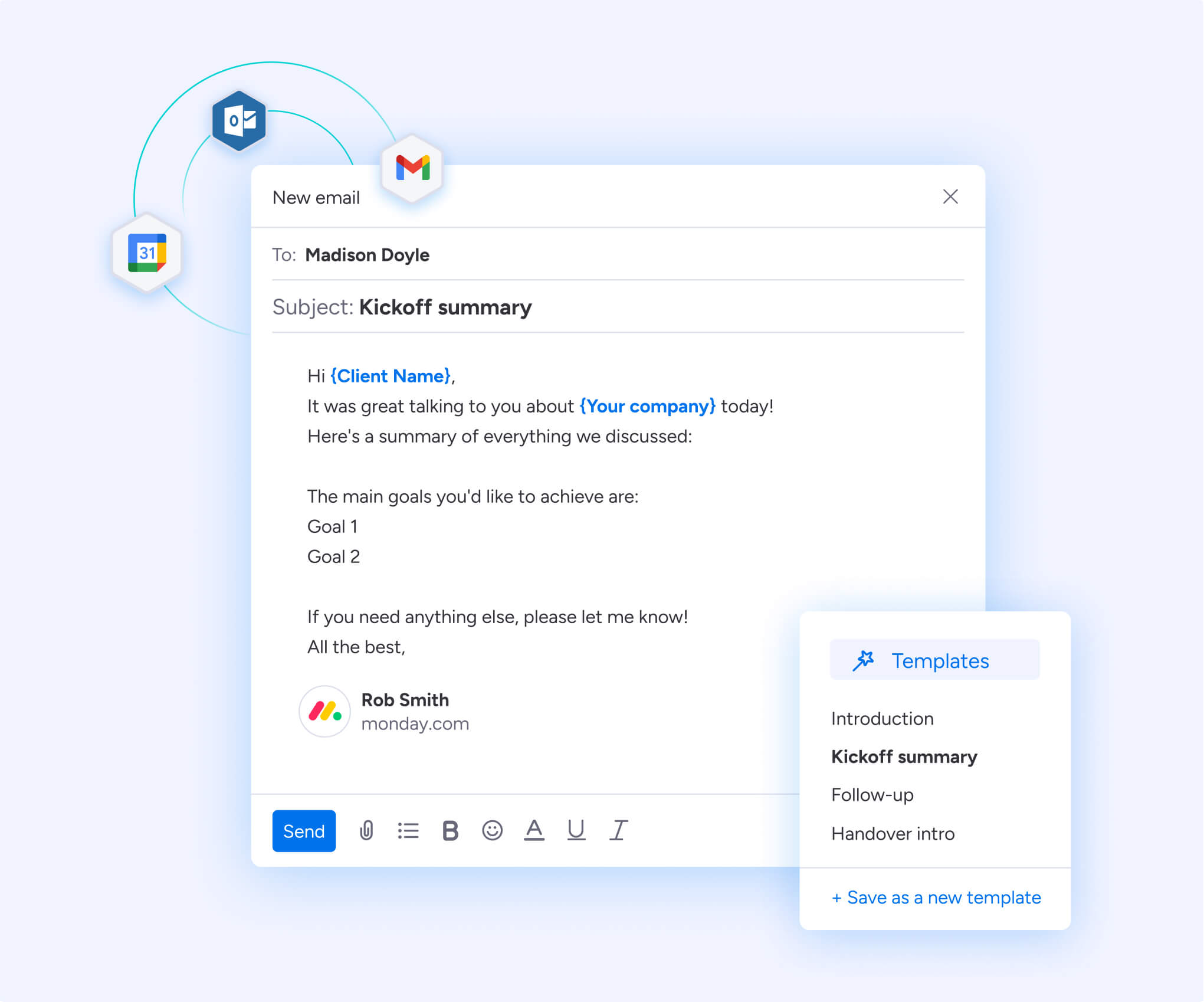
The solution’s built-in AI sales features help suggest custom automations such as follow-ups, status notifications, and more so that you can keep track and nurture every lead at the right time. Additionally, use monday CRM’s AI email assistant to generate emails that are personalized for every lead and client.
Make data-driven decisions with AI-powered analytics
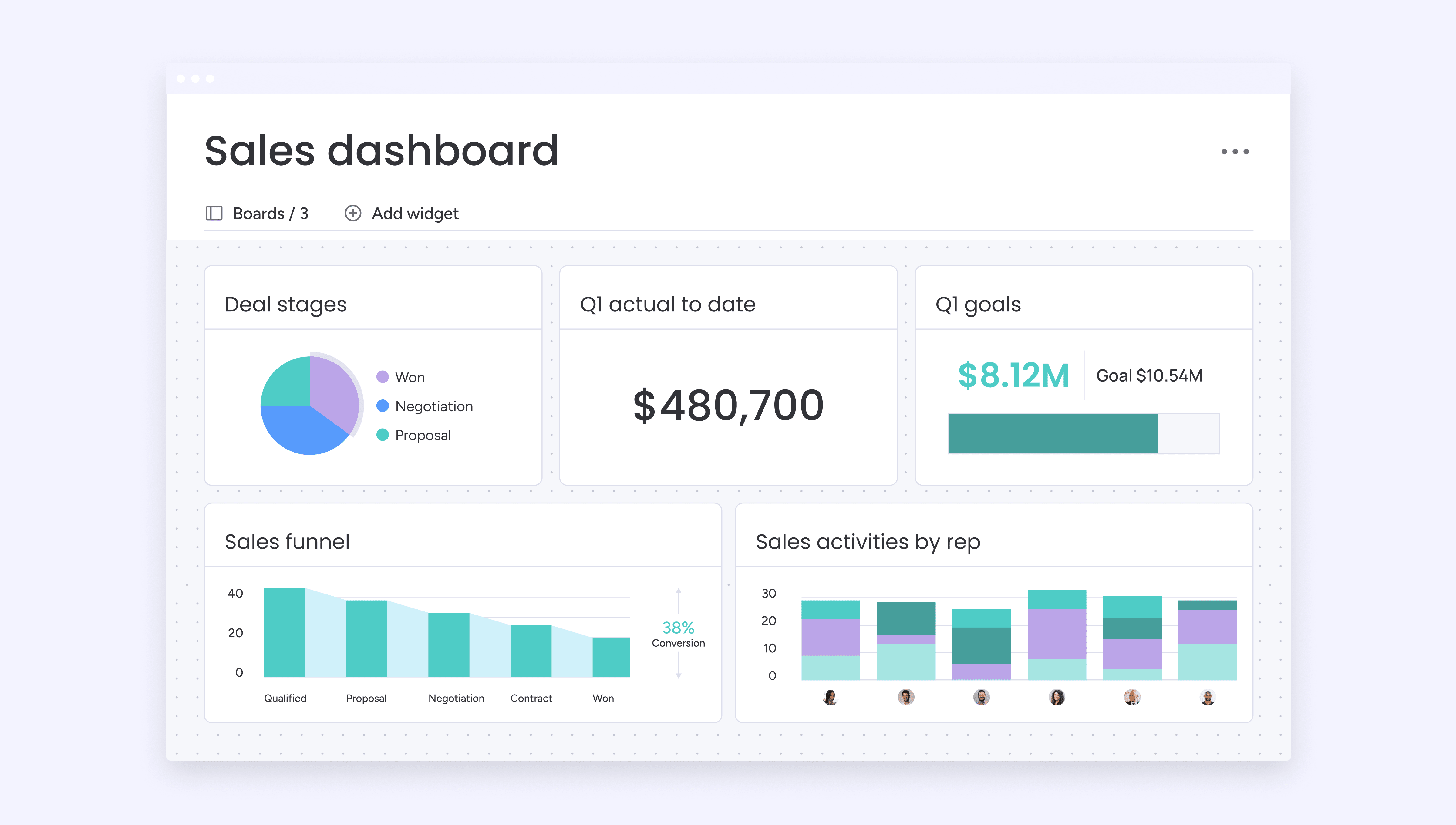
With AI-enhanced reporting and forecasting tools, monday CRM surfaces the most important data you need to make smart, timely business decisions of all sizes and priorities. Tailored, real-time insights help you cut through the noise and act fast when it matters most.
Metrics to track to optimize your lead management process
A good lead management process relies on having clear and comprehensive insights into how effectively it’s working. Tracking these metrics is important to continuously refine your lead management process. By looking at what’s working and what needs attention, you can optimize incoming leads and increase your conversion rates.
You should use your CRM to track key metrics, including these:
- Lead conversion rates tell you how effective are you at turning leads into prospective customers.
- Time to convert gives insight into how long it takes for a lead to become a prospect.
- Lead score tells you how likely each lead is to become a customer.
- Lead sources explains where your leads are coming from.
- Lead progress highlights where each lead is in your sales pipeline.
- Customer lifetime value (CLV) tells you the total revenue you can expect to generate from a single customer throughout your relationship.
A good way to monitor all the different B2C and B2B sales metrics for your lead process is to use an AI-powered customer relationship management (CRM) tool like monday CRM. Take the guesswork out of manual processes by automating data collection, surfacing key insights, and sending smart alerts when metrics need your attention. From intelligent lead segmentation to timely nurturing triggers, monday CRM helps you know where to focus next.
Supercharge your sales funnel and CRM with automation and AI
Your lead management process deserves close attention as it’s what determines the success of your sales team. After making sure you’ve built a reliable process by using the stages we covered above, the next move is coordinating it all in a solution like monday CRM, where your sales team can work collaboratively on nurturing leads and leverage AI-powered lead management automations for even more intuitive workflows.
Try monday CRMFAQs
What are the 4 steps of the lead generation process?
The 4 steps of lead generation are: attracting potential customers, engaging them with valuable content, capturing their contact information, and routing them to your CRM. From there, the lead management process begins by guiding each lead through qualification, nurturing, and conversion. Scroll up to explore all 7 process stages in detail.
What is the lead process flow?
The lead process flow refers to the journey a potential customer takes from first contact to conversion. It typically starts with lead capture, followed by tracking, qualification, nurturing, and conversion. A strong lead management process ensures this flow is smooth, timely, and supported by automation.
What is the lead management generation process?
The “lead management generation process” likely refers to the full cycle from generating a lead to managing and converting it. Lead generation brings prospects into your pipeline, while lead management focuses on qualifying, nurturing, and closing the deal. Together, they form a complete customer acquisition strategy.


